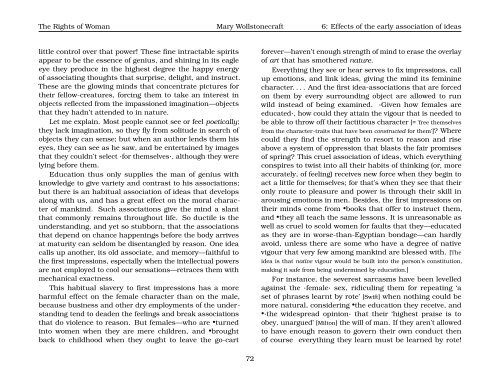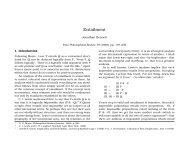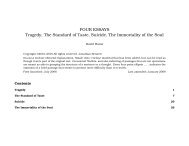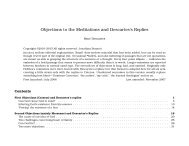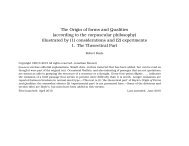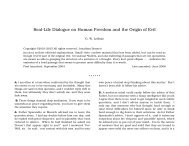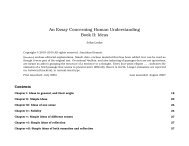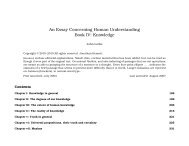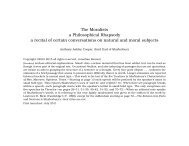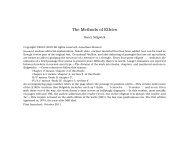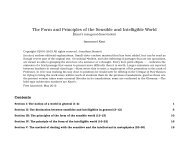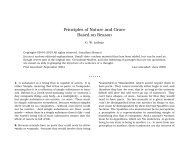A Vindication of the Rights of Woman with - Early Modern Texts
A Vindication of the Rights of Woman with - Early Modern Texts
A Vindication of the Rights of Woman with - Early Modern Texts
Create successful ePaper yourself
Turn your PDF publications into a flip-book with our unique Google optimized e-Paper software.
The <strong>Rights</strong> <strong>of</strong> <strong>Woman</strong> Mary Wollstonecraft 6: Effects <strong>of</strong> <strong>the</strong> early association <strong>of</strong> ideas<br />
little control over that power! These fine intractable spirits<br />
appear to be <strong>the</strong> essence <strong>of</strong> genius, and shining in its eagle<br />
eye <strong>the</strong>y produce in <strong>the</strong> highest degree <strong>the</strong> happy energy<br />
<strong>of</strong> associating thoughts that surprise, delight, and instruct.<br />
These are <strong>the</strong> glowing minds that concentrate pictures for<br />
<strong>the</strong>ir fellow-creatures, forcing <strong>the</strong>m to take an interest in<br />
objects reflected from <strong>the</strong> impassioned imagination—objects<br />
that <strong>the</strong>y hadn’t attended to in nature.<br />
Let me explain. Most people cannot see or feel poetically;<br />
<strong>the</strong>y lack imagination, so <strong>the</strong>y fly from solitude in search <strong>of</strong><br />
objects <strong>the</strong>y can sense; but when an author lends <strong>the</strong>m his<br />
eyes, <strong>the</strong>y can see as he saw, and be entertained by images<br />
that <strong>the</strong>y couldn’t select ·for <strong>the</strong>mselves·, although <strong>the</strong>y were<br />
lying before <strong>the</strong>m.<br />
Education thus only supplies <strong>the</strong> man <strong>of</strong> genius <strong>with</strong><br />
knowledge to give variety and contrast to his associations;<br />
but <strong>the</strong>re is an habitual association <strong>of</strong> ideas that develops<br />
along <strong>with</strong> us, and has a great effect on <strong>the</strong> moral character<br />
<strong>of</strong> mankind. Such associations give <strong>the</strong> mind a slant<br />
that commonly remains throughout life. So ductile is <strong>the</strong><br />
understanding, and yet so stubborn, that <strong>the</strong> associations<br />
that depend on chance happenings before <strong>the</strong> body arrives<br />
at maturity can seldom be disentangled by reason. One idea<br />
calls up ano<strong>the</strong>r, its old associate, and memory—faithful to<br />
<strong>the</strong> first impressions, especially when <strong>the</strong> intellectual powers<br />
are not employed to cool our sensations—retraces <strong>the</strong>m <strong>with</strong><br />
mechanical exactness.<br />
This habitual slavery to first impressions has a more<br />
harmful effect on <strong>the</strong> female character than on <strong>the</strong> male,<br />
because business and o<strong>the</strong>r dry employments <strong>of</strong> <strong>the</strong> understanding<br />
tend to deaden <strong>the</strong> feelings and break associations<br />
that do violence to reason. But females—who are •turned<br />
into women when <strong>the</strong>y are mere children, and •brought<br />
back to childhood when <strong>the</strong>y ought to leave <strong>the</strong> go-cart<br />
72<br />
forever—haven’t enough strength <strong>of</strong> mind to erase <strong>the</strong> overlay<br />
<strong>of</strong> art that has smo<strong>the</strong>red nature.<br />
Everything <strong>the</strong>y see or hear serves to fix impressions, call<br />
up emotions, and link ideas, giving <strong>the</strong> mind its feminine<br />
character. . . . And <strong>the</strong> first idea-associations that are forced<br />
on <strong>the</strong>m by every surrounding object are allowed to run<br />
wild instead <strong>of</strong> being examined. ·Given how females are<br />
educated·, how could <strong>the</strong>y attain <strong>the</strong> vigour that is needed to<br />
be able to throw <strong>of</strong>f <strong>the</strong>ir factitious character [= ’free <strong>the</strong>mselves<br />
from <strong>the</strong> character-traits that have been constructed for <strong>the</strong>m’]? Where<br />
could <strong>the</strong>y find <strong>the</strong> strength to resort to reason and rise<br />
above a system <strong>of</strong> oppression that blasts <strong>the</strong> fair promises<br />
<strong>of</strong> spring? This cruel association <strong>of</strong> ideas, which everything<br />
conspires to twist into all <strong>the</strong>ir habits <strong>of</strong> thinking (or, more<br />
accurately, <strong>of</strong> feeling) receives new force when <strong>the</strong>y begin to<br />
act a little for <strong>the</strong>mselves; for that’s when <strong>the</strong>y see that <strong>the</strong>ir<br />
only route to pleasure and power is through <strong>the</strong>ir skill in<br />
arousing emotions in men. Besides, <strong>the</strong> first impressions on<br />
<strong>the</strong>ir minds come from •books that <strong>of</strong>fer to instruct <strong>the</strong>m,<br />
and •<strong>the</strong>y all teach <strong>the</strong> same lessons. It is unreasonable as<br />
well as cruel to scold women for faults that <strong>the</strong>y—educated<br />
as <strong>the</strong>y are in worse-than-Egyptian bondage—can hardly<br />
avoid, unless <strong>the</strong>re are some who have a degree <strong>of</strong> native<br />
vigour that very few among mankind are blessed <strong>with</strong>. [The<br />
idea is that native vigour would be built into <strong>the</strong> person’s constitution,<br />
making it safe from being undermined by education.]<br />
For instance, <strong>the</strong> severest sarcasms have been levelled<br />
against <strong>the</strong> ·female· sex, ridiculing <strong>the</strong>m for repeating ‘a<br />
set <strong>of</strong> phrases learnt by rote’ [Swift] when nothing could be<br />
more natural, considering •<strong>the</strong> education <strong>the</strong>y receive, and<br />
•·<strong>the</strong> widespread opinion· that <strong>the</strong>ir ‘highest praise is to<br />
obey, unargued’ [Milton] <strong>the</strong> will <strong>of</strong> man. If <strong>the</strong>y aren’t allowed<br />
to have enough reason to govern <strong>the</strong>ir own conduct <strong>the</strong>n<br />
<strong>of</strong> course everything <strong>the</strong>y learn must be learned by rote!


